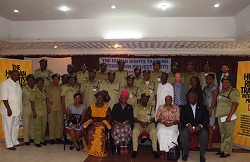November 2012
- Posting by PRAWA
- News

By Abazie Cynthia,
Assistant Programme Officer- PRAWA, Abuja
 The Human Rights Integration Project (HRTI) is aimed at improving the awareness and observance of international human rights principles and good prison practice in Nigerian prisons through the facilitation of a system for Human rights education within the prisons. The project started with a training of a pull of regional and prison training institution based trainers on International Human Rights Standards and Good Prison Practice.
The Human Rights Integration Project (HRTI) is aimed at improving the awareness and observance of international human rights principles and good prison practice in Nigerian prisons through the facilitation of a system for Human rights education within the prisons. The project started with a training of a pull of regional and prison training institution based trainers on International Human Rights Standards and Good Prison Practice.
It was expected that individuals trained will replicate such trainings in their regions. Hence, on 11 October 2012, the project’s the follow up workshop was held at the Nigerian Prisons Service Headquarters with about 20 participants. It was ushered in by an opening remark by the Controller General of Prisons, Mr. Zakari Ibrahim, who stated that the training provided for Prison officer under the project focuses on the human rights of prisoners. According to him, under the law, the only restriction placed on prisoners is their freedom of movement and liberty, hence they are entitled to respect for their fundamental human rights. He warned that prison officers must be careful not to deny prisoners of their rights.
Mrs. Ann Bekom, provided an analysis of the state of Human Rights in Nigerian Prisons. After acknowledging the universality of human rights, she emphasized that there is need for prisons to make the protection of inmates’ human rights one of their major priorities in order to put a human face on the penal system. Her presentation was followed by an Overview of the United Nations Standard Minimum Rules for the treatment of Prisoners (UNSMR) by Mr. Ernest Chibogu.
He gave a detailed description of the provisions of the UNSMR and highlighted that the major rationale for the rules was to humanize the penal system and to ensure that prisons conformed to global standards of civilized conduct. Mr. Iyeh Solomon spoke on the Role of Prison Officers in the Observance of the UNSMR. He stated that the primary role of prison officers is to safeguard inmates within their custody; hence, there is need for strict observance of all the provisions of the UNSMR. He concluded his presentation by stating that most of the provisions of the UNSMR have been adopted in the Prison Act and the Prison Standing Order.
Mr. Attangso Haruna critically examined the compliance of the UNSMR by Nigerian Prisons. He stated that although the NPS partially complies with the UNSMR’s provisions on Accommodation and Clothing, it fully complies with the provisions on Feeding, Water, Education and Religion. The workshop identified several challenges and among other things, it was decided that there was need for attitudinal change among prisons officers and the public.
As part of the next steps, the participants agreed that there will be training of more prison officers on the UNSMR using the weekly Thursday Lectures by the various trainers at the various prisons, as well as subsequent training of prisoners on their rights and duties in the prisons.
Thursday Lectures by the various trainers at the various prisons, as well as subsequent training of prisoners on their rights and duties in the prisons.
In Enugu State, 14 prison officers were trained during follow up training held for senior prison officers by officers trained under the HRTI Project. Currently the Officers-In -Charge in these states are being sensitized to include the Human Rights presentations during their weekly Thursday lectures and are encouraged to form a team of Human Rights officers in the prison so as to sustain the process.
More awareness is also being created on this subject by the Officers in charge in Kaduna where about 10 officers have being trained. This entire project is expected to make a long term impact in improving the conditions and treatment of prisoners and improving the staff inmate relationship in the targeted prisons and reduce tension within prisons and thereby reduce the tendency of riots.
